
Recently on Cyclingnews.com |
An interview with Axel Merckx, March 17, 2006
Nearing an end, but motivation high
Part of the Phonak eight for Milan-San Remo, the son of cycling's best-ever rider is considering retirement. But, as Axel Merckx tells Cyclingnews' Shane Stokes, he ain't going to go quietly...
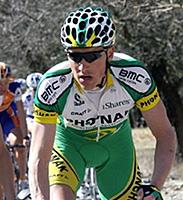
|
Time is ticking. Either this season or next, a Belgian Olympic bronze medallist will announce his retirement from the sport. Axel Merckx hasn't won as much as his compatriots Boonen or Van Petegem, but the widespread recognition of his name plus the concomitant presence he has within the sport will mean that the news will draw big headlines in the cycling world.
Before then, though, he's got several big ambitions to achieve, goals to chase and victories to try to win. Liège-Bastogne-Liège is close to his heart, a repeat stage win in the Giro would be very much appreciated and a stage victory in the Tour; well, that would be really something. He went close last year on the stage to Mende and while it didn't quite work out that time, you can bet he'll do everything he can to pull off the win this time round.
Merckx still has hunger and, on the basis of rides such as his superb stage win in the Dauphiné Libéré last year, still has the legs, too. It's the lure of family life, spending more time with his wife and daughter which is that which will finally coax him off the bike. Yet as the months, weeks and days tick down to his last race – a deadline which is still to be decided – the limited time he has left will act as a real incentive to race as well as possible and to achieve some important goals.
If he needed an extra incentive to do well, he's got one. Merckx is drawing additional motivation from his off-season transfer from Davitamon-Lotto to Phonak. Axel has long wanted to work with childhood friend John Lelangue and now, in a curious parallel with their fathers' lives, the two will act in a rider-directeur sportif capacity three decades after Eddy Merckx and Robert Lelangue did the same. Axel is looking forward to their partnership.
Cyclingnews: How are you finding the new team?
Axel Merckx: It is going well. I really like it, the organisation is fantastic and everybody on the team is really friendly, really available. It is good.
CN: Is the setup here very different to that of your previous team, Davitamon-Lotto?
AM: It is different in the way that you are starting over with new people, a different team with John [Lelangue] as manager. I know John since we were kids, so it makes it much easier to adapt to the team, too. I know Floyd pretty well and I know some of the other guys pretty well too. They know me, and having Koos [Moerenhout] with me as well makes the change really smooth.
CN: How did the whole move come about?
AM: Well, John and I really wanted to work together for the longest time. It never really was possible because, first of all, he was never manager of a team and, secondly, when he did become manager of a team I had a contract with Davitamon already. He came really late so it was too late to change over.
Then last year it became possible, thanks to Phonak's talks with Andy [Rihs]. Because myself and John knew each other for a long time, we really wanted to work together. Andy made that possible.
CN: How did you know John? Was it through his work with the Tour?
AM: No, it was because his dad [Robert Lelangue] was the directeur sportif of my dad. So we grew up together, we know each other since we started to walk. His dad then worked afterwards in the [Merckx bike] factory with my dad, he still does but he has kind of retired right now. So myself and John have been friends a long time and grew up together, basically.
CN: How does he differ from other directeurs sportifs?
AM: I don't know, I will find out a little bit later. I think it is a little bit early right now to compare him to everybody else, but... me and him, we were friends before we were manager/rider, so I think that is the main difference. We are almost the same age...there is only two years difference. I grew up with him, too...there is not a lot of people you can say that about.
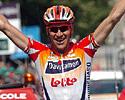
|
CN: You had some nice results last year, in particular that stage win in the Dauphiné. What would you like to do in 2006?
AM: I hope I can do even better. Hopefully I can win a stage in the Tour, maybe I can be a strong contender in the classics, be there in the final stages [of the races]. And help Floyd maybe in the Tour...they are the main goals of the team.
CN: The day you won the stage in the Dauphiné, did you feel you were on a very good day?
AM: Not necessarily...it just happened to work out like that. I got in the right breakaway, then it didn't really work well so I thought ‘okay, let's try one more time and see if I can get someone to come with me.' But nobody came with me, and then kept going; I had too much of an advantage to wait for them, so I decided to ride and ended up doing a big one that day.
CN: Would that be one of your best memories as a pro?
AM: Yes, for sure, because it was something... I was out there for 150 kilometres with two teams chasing me down. At that time of the year, when everyone is eager to win a ProTour race...it is for sure one of my best memories in this sport.
CN: You were third on stage 18 of the 2005 Tour, finished behind Serrano and Vasseur. You were a bit unhappy with him [Vasseur] at the finish...
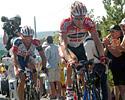
|
AM: Yeah, but that's... There are things in racing that you get mad about at the time, but afterwards you forget about it. You have the adrenalin, it is the Tour de France, it was national Belgian day. Stuff happens, and you have some reaction that maybe you shouldn't have. Or maybe it was justified at the moment, but then afterwards you have to move on.
CN: Was that the closest you have come to a stage win at the Tour?
AM: It was pretty close, I think. But Serrano was the strongest, and there is no reason to be ashamed to be beaten by someone who is stronger than you.
CN: It was a pretty tough finish with that hill in Mende....
AM: Yes, you either had it or you didn't have it. He was more of a climber than me, so that was my bad luck that day.
CN: Looking back at your career, what have been the highlights for you so far?
AM: Well, the Olympic medal, for sure. The national jersey, a stage win in the Giro and the Dauphiné...those are the main victories. They were all achieved in certain ways that made them really special for me.
CN: You got bronze in the last Olympic road race and then before that, in Sydney, you were 12th there... So you have a good record in the Games...
AM: Yes...
CN: So presumably you are going to be motivated for 2008?
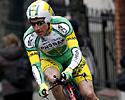
|
AM: I don't know, we will see. I will take it one year at a time because I am getting a little bit older now. With the family extending, I think it is time to focus a little bit more on that. So I don't know...as long as I am still enjoying it, I will keep going but it is going to have to end some day. And I think it will be before the next Olympics...
CN: How much time do you spend in Canada?
AM: Normally from mid-September to January. We have a house there, Jodi [Merckx's wife] has her family there...I like the lifestyle, in some ways I like being away from the cycling world...it is a good way to enjoy quality family time there.
CN: With the surname you have, does that put more demands on you in terms of attention than might otherwise be the case?
AM: Oh, for sure. But that is one of the reasons why I moved away from Belgium. There was a lot of attention, a lot of demand there, but I need to be my own person. Sometimes you have to make decisions like that [moving away]...people either understand it or they don't.
CN: You live in Monaco...how do you find that?
AM: It is good. I have been there for ten years. I have my habits there and now my wife also has her habits there. My oldest child is going to preschool there so we have our lives there now.
CN: When you do retire, have you thought about where you will settle?
AM: No...as long as you are still racing, it is hard to make a decision about the future. It all depends on what kind of job I am going to do in the future. But we have a house in Canada and, more than likely, we will end up spending some time there. Perhaps not, but most likely I will.
CN: Moving away from retirement and going back to this season, what do you want to achieve?
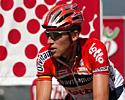
|
AM: Well, like I said, hopefully I can be a contender in Liège or one of those classics in the spring. Then have a good Tour, and try to do something for a stage in the Giro also. I think there are a lot of possibilities, a lot of races to do well in this year.
CN: Will you be aiming to hit form around the time of Liège and then carry it on into the Giro?
AM: Yes, something like that. I think that is my main goal, trying to be real good at Liège and then carry it on to the start of the Giro in Belgium...at least for the first week, see where I will get, and then after that come back and rebuild to have a good Tour.
CN: Have you worked out your program up until the Giro?
AM: Yes, I do the Classics, basically... I do Flanders, Amstel, Flèche, Liège. I then have two weeks before the Giro, and then the Giro and the Tour.
CN: There seems to be a good feeling on the team... There are quite a few guys who seem motivated to help out in the Tour, and the team can go there with expectations of doing well.
AM: Yeah, for sure... I think we have a big challenger with Floyd on the team. I think we should try help him be the best contender he can be. In addition to that, I hope to be able to go for a stage win myself.
